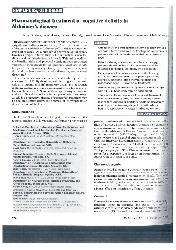Please use this identifier to cite or link to this item:
http://hdl.handle.net/11054/76| Title: | Pharmacological treatment of cognitive deficits in Alzheimer's disease. |
| Authors: | Brodaty, Henry Ames, David J. Boundy, K. Snowden, John A. Storey, E. Yates, Mark |
| Issue Date: | 2001 |
| Publisher: | Australasian Medical Publishing Co. |
| Place of publication: | Pyrmont, NSW. |
| Publication Title: | Journal of the Australian Medical Association |
| Volume: | 175 |
| Issue: | 6 |
| Start Page: | 324 |
| End Page: | 329 |
| Abstract: | Clinical trials and independent reviews support the use of cholinesterase inhibitors for treating the symptoms of patients with mild to moderate Alzheimer's disease (AD). Before initiating cholinesterase inhibitor therapy, patients should be thoroughly assessed, and the diagnosis confirmed, preferably by a specialist. Compliance with cholinesterase inhibitor therapy should be monitored and the response (in global, cognitive, functional and behavioural domains) reassessed after 2-3 months of treatment. Vitamin E may be protective against AD, and therapy with 1000 IU twice daily may be considered. There is insufficient evidence to support the use of other antioxidant agents, anti-inflammatory agents, monoamine oxidase B inhibitors, folate/homocysteine or antihypertensive drugs in patients with AD, or hormone replacement therapy in affected women. |
| URI: | http://hdl.handle.net/11054/76 |
| ISSN: | 0025-729X |
| Internal ID Number: | 00062 |
| Health Subject: | REVIEW ALZHEIMER DISEASE - DRUG THERAPY CHOLINESTERASE INHIBITORS - THERAPEUTIC USE HUMANS PRACTICE GUIDELINES AS TOPIC UNITED STATES UNITED STATES FOOD AND DRUG ADMINISTRATION CHOLINESTERASE INHIBITORS |
| Type: | Journal Article Article |
| Appears in Collections: | Research Output |
Files in This Item:
| File | Description | Size | Format | |
|---|---|---|---|---|
| 00062.pdf | Copyright 2001. Reproduced with permission. | 3.06 MB | Adobe PDF |  View/Open |
Items in DSpace are protected by copyright, with all rights reserved, unless otherwise indicated.
